MINORITIES WHO FIGHT FOR ISRAEL
by Rabbi Levi Welton
Addendum: "It’s Time I Break My Silence" by Yusaf Haddad
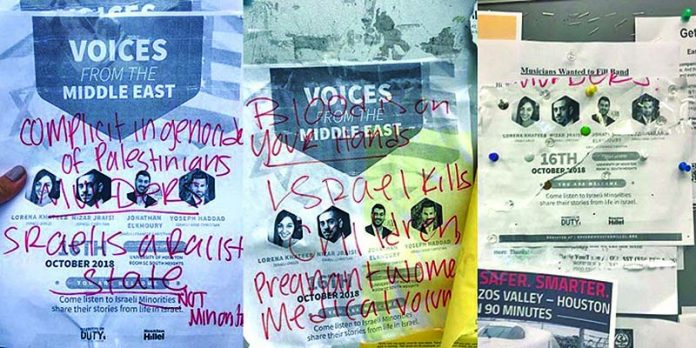
In a beat up old sedan, four Middle Eastern millennials sat in silence as Arabic music blasted from the radio. As the car hurtled down the highway, the driver leaned forward and cranked up the volume to the max. Pretty soon, they were all singing together at the top of their lungs as they lowered the windows and let the fresh Texan wind sweep through their hair.
Where were they headed?
To a university campus for the anti-Israel “Apartheid Week.”
Who were they?
An Arab, a Druze and two Christians.
What was their target?
To defend the Jewish state from the bigotry of the BDS (Boycott, Divestment and Sanctions) movement.
* * * * *
What led these non-Jewish volunteers to embark on this journey was the unfortunate reality that, although we live in an era of “micro-aggressions” and “safe spaces,” the anti-Israel sentiment at universities in the US has become so hostile that many have decided that the best course of action is to take no action at all. As a college student at UC Berkeley told Haaretz media in an interview back in 2016, “You could risk losing friends from the other side… so when I’m asked, I just say that I love all people.”
Part of what has contributed to the anti-normalization and delegitimization of pro-Israel voices on campus is the hijacking of intersectionality as it relates vis-à-vis to Jewish college students. In other words, the anti-Israel groups have developed a new tactic where pro-Israel activists are painted as being automatically anti-social justice.
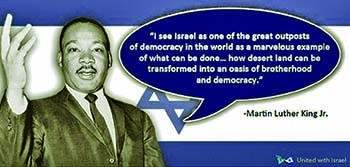
To achieve this, they have embedded themselves amongst social justice coalitions for minorities such as black, Latino, Asian, Native American, feminist and gay rights groups on campus. As the New York Times reported, “The coalitions – which explicitly link the Palestinian cause to issues like police brutality, immigration and gay rights – have caught many longtime Jewish leaders off guard, particularly because they belonged to such progressive coalitions less than a generation ago.”
Rabbi Chaim Seidler-Feller, who served as director of UCLA Hillel for 40 years, says camouflaging themselves amongst these popular groups has allowed anti-Israel activists to essentially say “we can say what we want because you oppressed us, and we earned that right, while you can’t say anything. And whatever you say about our suffering is not welcome, not legitimate and not sincere.”
For Jews who want to be involved with minority groups, such as The Women’s March or Black Lives Matter for example, have had their own minority status questioned. Plus, their very identity as Jews might now be a valid reason for being barred entry to various groups on campus.
Which brings us back to these four Middle Eastern kids hurtling down the highway to challenge the BDS narrative that demonizes Israel. They are part of the new Minorities Project created by Reservists on Duty (RoD), a non-profit that recruits volunteers to travel across college campuses challenging anti-Israel activists who demonize Israel. All four are minorities from Israel and they have a clear message for anyone who will listen:
“Never be afraid to speak up in support of Israel”.
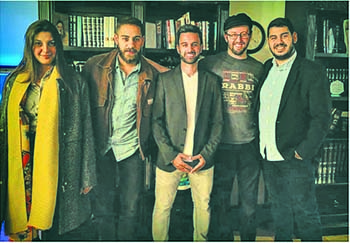
Founded in 2015, Reservists on Duty was established by Israeli reserve combat soldiers who felt that their duty wasn’t over and they had to do more to protect their homeland from the public relations battle raging across campuses in the West. Although there are other organizations like the Israeli Soldiers Tour, My Truth, and Our Soldiers Speak that also bring Israeli veterans to colleges, I think it’s the “Minorities Project” that makes RoD truly unique. Deliberately avoiding apologetic Hasbara, these Israeli Arabs and Christians talk openly about the issues and are proactive in defending the only democracy in the Middle East. As they told me, “We don’t feel like minorities in Israel, we feel like Israelis in Israel and we will do whatever we can to defend our home against the lies and bias that are out there.”
Of course, some will say that these volunteers don’t represent all the Arab, Druze and Christian populations of Israel and therefore shouldn’t be allowed to represent these communities. To those “haters”, I wish to make two points: Firstly, how do you know that? How do you know there isn’t a “silent majority” that feels very differently than the ones who hold the proverbial mega-phones? And secondly, isn’t this the whole point of minority rights? To give a voice to those discriminated few who have their own way of looking at things even if they’re of a different skin color, another religion, or even (gasp) pro-Israel?! As Martin Luther King famously said “I see Israel, and never mind saying it, as one of the great outposts of democracy in the world, and a marvelous example of what can be done, how desert land almost can be transformed into an oasis of brotherhood and democracy.”
So let me introduce you to these four millennials from the Minorities Project who fight to show the world that being passionate about Israel and passionate about civil rights are harmonious.
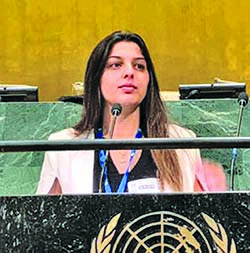
Lorena Khateeb is an Israeli Druze from the Galilee who lives by the motto, “Be a girl with a mind, a woman with attitude and a lady with class.” Her friends jokingly call her a “minority within a minority” because of her gender and ethnicity but her mission in life is no laughing matter. “I’m here to break the silence – in a good way,” she told me. “I want to improve the voices of women and help them do whatever they want and never let anything limit them.”
Having studied political science, sociology and anthropology, she attended Israel’s “National Service” program working with youth. Today, her day-job is as a counselor for children near her hometown and her hobbies include playing piano, painting, and, of course, volunteering for Reservists on Duty.
When I told her she was like wonder woman, she laughed and said, “Gal Gadot (the Israeli actress who played “Wonder Woman” in the recent Hollywood blockbuster) is an inspiration of mine.” I thought she meant because of the superpowers but Lorena didn’t hesitate to correct me. “No, because [Gal Gadot] brings a brave message to Middle Eastern women like myself that you can be yourself and follow your dreams.”
Her burning message to students on campus is that Israel is the only country in the region where the status of Arabic and Druze women is actually improving. When I asked her what she thought of Israel’s new nation-state law, she said “I actually was one of the organizers of a 10,000 person rally to protest this law. Some of my colleagues are supportive of the law but I think it’s not a bill supporting equality. I would add something in the bill to advocate for Druze and other minority communities who want to integrate into Israeli society.”
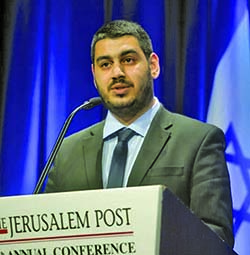
Jonathan Elkhoury is the Project Coordinator for Reservists on Duty and loves to quote Nelson Mandela who said, “Education is the most powerful weapon which you can use to change the world.”
“They say that Israel is an apartheid state but, if it is an apartheid state, the 25% who are minorities wouldn’t be able to live our lives freely,” he says.
When I asked Elkhoury why he thinks Israel is the best place for minorities in the Middle East, he replied forcefully, “I think it’s a fact. I was born in Lebanon and my hometown used to have a majority of Christians but now you see all the Middle East how minorities are being persecuted and beheaded. Look at what’s happening in Egypt, Iraq and Syria. If you want to use Christianity as an example consider that outside of Israel, the population of Christians in the region has plummeted from 20% to less than 3%.”
When pressed for his opinion on the group “ Breaking the Silence,” he responded, “They lost all legitimacy once they stopped actually giving accurate criticism and started spreading blatant lies around the world only to get money for their activities. Look, Israel is not perfect but it upsets me that they can manipulate false information so freely. I always say that there’s a difference between being pro-Palestinian and anti-Israel. With people who are pro-Palestinian, we can agree on human rights issues but with anti-Israel activists, there’s nothing to work with.”
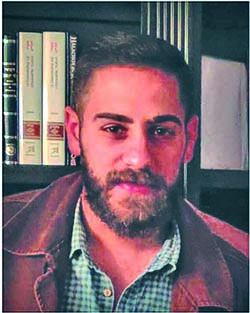
Nizar Jraisi is an Israeli Christian who considers his Christianity “a way of life,” because what matters to him most is “what your spirituality informs you to do daily.”
Naturally a private person, he was drafted into the IDF and considers it a “blessing” to have served his country. “When I look at Israel, I see a democratic country that protects me by law, protects my family and protects anyone regardless of religion or belief.”
OY: What would you say to Palestinians who don’t feel “blessed” like you?
NJ: “I really connect with their struggle and feel terribly sad for what they experience.
The conflict is not their fault; it’s the fault of their leadership. “Free Palestine” is a famous slogan that people follow blindly but it should really be “Free Palestine from its corrupt leadership.”
Have you said this to anti-Israel activists on American campuses?
“Yes, recently we went a campus to speak and our flyers were vandalized. We’re used to people shouting at us nice comments like “Baby Killers” or “Apartheid Racists” so my attitude has been to try and engage with students in a way that gets past all the screaming. So I was speaking to this one girl who is a part of the Students for Justice in Palestine group and, without telling her who I was or where I was from, I began asking her why she is anti-Israel. She told me it’s because “Non-Jews in Israel can’t be represented by lawyers” and that they even “can’t take the same buses as Jews.” I pulled out my passport and showed it to her and said, “I’m not Jewish. I’m a Israeli Christian and everything you said is false and dangerous. It’s straight up incitement to share all the things you said with fellow students!” She was speechless.
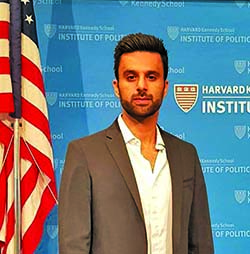
Although Yusef Haddad had spent the past few days touring American colleges and had to get up early the next morning to speak at Harvard about his pro-Israel activism, when he sat down with me, he didn’t seem exhausted at all. The 33-year-old Israeli Arab comes from a family that has been in the Holy Land for seven generations. He was injured in the Second Lebanese War while serving as a soldier in the Israeli army. After finishing his service in the IDF, he started a successful business selling Dixie products in Canada, sold it and used some of his hard-earned capital to launch a non-profit that translates into English as “Together – Vouch For Each Other.” It builds bridges that bring together Arabs and Jews in meaningful social connections in Israeli society.
Interestingly, he is a strong critic of the Arab ministers in the Knesset who he feels have “lost touch with the needs of the Arab community.”
Additionally, he volunteers his time for Reservists on Duty because, “I’ll never forget the suicide attack of October 4, 2003. I was still in the army and a female terrorist had blown herself up in a cafe killing 17 people, 4 of them who were Arab. It hit me that day that I’m not just defending the Jews; I’m defending all Israelis. By the way, I was a commander in the Golani Brigade, so for all those people who say Israel is an apartheid state, how is it possible that an Arab was a commander over a unit of Jews?”
OY: What’s the most important message you have for minorities in America?
YH: “It’s hard for me to use that term “minorities.” Israel is for everybody. I want my people to be counted as part of one cohesive society and not divided into religious, racial, or ethnic categories.”
Do you think that’s possible to achieve considering the current geopolitical climate?
YH: “I always say that this process needs patients. Even when you draw a long line, you must start with a small dot. I take off my personal time to come out to the US to talk to students because I know that peace will eventually be achieved. It may not happen in a day, but I want to help achieve this dream by fighting against organizations who exploit minorities in their ruthless attack against Israel, my home.”
Editor's Addendum:
This article is called "It’s Time I Break My Silence" and is
archived at
https://www.jpost.com/Opinion/Its-time-I-break-my-silence-569481/.
It was written by
Yoseph (Yusef) Haddad and published October 15, 2018, one week before
he was off to Harvard University, to counter the false claims of, as
he writes, "the Israeli organization, Breaking the Silence, an
organization funded by anti-Israel groups that incites against the
State of Israel and defames the IDF."
From The Jerusalem Post: "Yoseph Haddad age 33, is an Arab Israeli Christian. A resident of Nazareth, he was injured in the Second Lebanese War while serving as a soldier in the Israeli army. A social activist in the Arab community, he is the CEO of the nonprofit organization Togther – Vouch For Each Other, which builds bridges that bring together Arabs and Jews in meaningful social connections in Israeli society. He is also involved in public relations through the organization Reservists on Duty.
Haddad writes:
Next week, Harvard University will be hosting the Israeli organization, Breaking the Silence (BTS), an organization funded by anti-Israel groups that incites against the State of Israel and defames the IDF. BTS members speak out against the IDF; they “testify” as former soldiers, but they do not tell the entire truth of situations– they distort the truth and they tell partial stories that provide a slanted and partial picture of reality.
They do this to serve their only purpose: to slander and defame the State of Israel and the IDF. We have so many enemies all around us who want to destroy us and it is the most painful when this defamation comes from within us. BTS will be speaking at Harvard University, one of the most prestigious institutions in the world – a stronghold of future leaders in every field. Many of its students will go on to hold key positions of power and influence. In speaking before the students there, BTS will be shaping the outlook of these future leaders against the State of Israel, against our country.
I cannot be silent, I must break my silence. I served in the IDF during the Second Intifada. It was a difficult time. I also stood at checkpoints, stood guard, arrested people and fought in the Second Lebanon War. As an Israeli Arab and IDF solider in the Golani Brigade, I served together with other Israelis: Jews of all backgrounds, Druze and Bedouin. We were all equal, we were all brothers fighting side by side and I can testify that I served in the most humane and moral army in the world, with the highest code of ethics and human values. The IDF is an army that faces complex challenges and dilemmas in an explosive region, but it is an army that is level headed and always keeps as its ultimate highest value human life. The IDF is an army that will bend over backwards to save lives and to ensure that innocent individuals are not harmed, even if it means complicating the military operation.
It is possible that there were incidents that did not live up to these standards, but these were the exceptions; they were not the norm and they were not the code by which the IDF is guided. They do not reflect the IDF nor the State of Israel. I am proud to have served under commanders who not only turned me into a better soldier but into a better person. One of the commanders who most impacted me was Israeli Major Roi Klein, who lost his life while trying to save the lives of his soldiers. During the Second Lebanese War, I was badly injured after I was hit by a cornet missile that was fired by Hezbollah. My fellow soldiers saved my life while under attack; they risked their own lives to save mine. After my injury, I received full medical care from the State of Israel until I was completely healed.
I will not let BTS spread untruths and lies against my country. Two days after BTS takes it stand at Harvard, I will be there to speak to the students with Reservists on Duty. The truth will prevail.